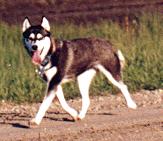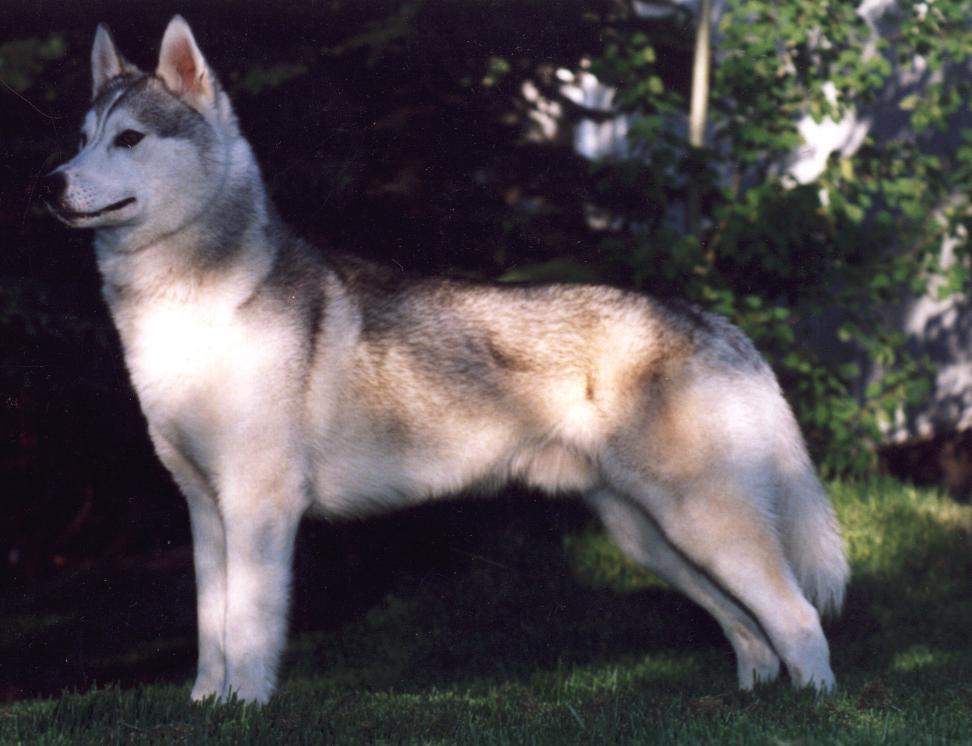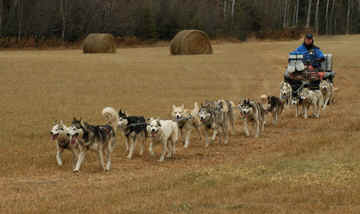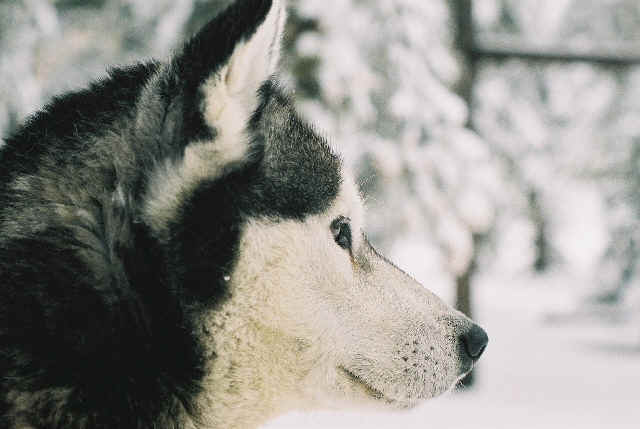Preparing for 2004 Iditarod
Interview: Musher Karen Ramstead
on breeding, training, racing Siberians
When
we learn that Karen Ramstead had entered the 2004 Iditarod with her North Wapiti Siberian Huskies, we
thought that a musher planning to run the Last Great Race a fourth time ought to be
featured in The Racing Siberian Husky Online. So we asked if she would do an interview by
email. She agreed. Here are her thoughts about breeding, training and running the
Iditarod with Siberians -- and her goal for the 2004 race.
WDW: Why did you choose the Siberian Husky breed? Were you thinking specifically
of getting a working sled dog?
Karen: My husband bribed me to move to
northern Alberta with the offer of a purebred dog. I researched many different northern
breeds and ended up settling on a Siberian because the books I had been reading said they
were the best purebred breed for racing. I never really intended on running dogs though
until friends took me for my first sled ride. I immediately knew I had found a passion.
WDW: What two or three dogs do you consider the foundation stock for your North
Wapiti kennel, and who were the breeders?
| Karen: Primarly our first
Siberian Husky - Meomar's Miss Liberty, bred by Jackie and Chris Marshall of Invermere,
BC. I was so lucky to stumble upon Marshall's right off the bat. If I started all over
again today, knowing what I know now, I'd still pick Libby for a foundation bitch. She had
a fabulous pedigree (out of Meomar's Quick Lynx - sired by Judy Roger's Northome's Sayak
of Spindrift), was as sound as any Siberian I've ever met, and was very genetically
healthy. |

Meomar's Miss Liberty
|
She was also a incredible teacher - although I
swear I caught her rolling her eyes at me a time or two as I stumbled along learning about
the breed. She died this past winter at 15 1/2.
| Another significant dog in our kennel has been
BIS, BISS Ch. Chuchinka's Shawn Boy SD, bred and owned by Bob and Loreen Bridges of Prince
George, BC. Shawn was such an incredible mover, he
made the hair on your arms stand up when he gaited around a show ring.
Shawn was also a hard driving leader for Bob. He was
probably one of the most true dual purpose dogs I've ever met. |

BIS, BISS Ch. Chuchinka's
Shawn Boy SD
|
He was 1/2 show lines (sired by BIS, BISS Ch.
Shisaido's Satinkist Swordsman) and 1/2 old Canadian working lines (out of Chelyuskin's
Mila SD - who goes back to Chris Camping's lines). He passed on last summer at close to
15.
WDW: What stimulated your interest in racing your Siberians, and what were your
early racing experiences like?
Karen: The Marshalls were into racing and
that was my early encouragement to give it a try. Our first races, in around 1990/1991,
were sprint races in the Grande Prairie, Alberta, area. We were the only purebred team in
the area, but we were never too far off the pace of the other teams. Then in 1994, Bob
Bridges encouraged me to try a 54-mile race in Quesnel, BC. It was not a purebred class
and we actually won, which really got us hooked on the longer stuff. In 1996 we ran the
Race the Sky in Montana and finished 4th. That race locked up my love of distance racing.
"In 1996 we
ran the Race the Sky in Montana
and finished 4th. That race locked up
my love of distance racing."
WDW: What are the breed’s strengths and weaknesses as racing sled dogs?
Karen: Well, I think the breed's biggest
weakness is their intelligence. :) I work alot with Jamie Nelson in Minnesota and get to
compare the learning curve and performance levels of her Alaskans to my Siberians. The
Alaskans don't seem to have to have things 'explained' to them like the Siberians do. You
show them what you want and they will apply themselves 110% to the task. The Siberians
tend to need to be shown why it is to their advantage to do this and want to always know
what is in it for them.
As for strengths - I think the breed is much hardier and
more 'durable' then many Alaskan lines. Not enough Siberian distance teams try to use
these things to their advantage though. Take booties for example, I rountinely use about
2/3 less booties on the trail that most teams do. Saving that 30 - 45 minutes on the
trail or in a checkpoint can be an advantage - yet most Siberian mushers bootie like the
Alaskan drivers do, not wanting to trust the tough feet of their dogs.
WDW: What other dog sports and activities are you involved in with your Siberians?
Karen: Since we started focusing on the
Iditarod, I've narrowed down the activities I do with my dogs due to lack of time. Showing
in the conformation ring is really the only other thing we are seriously involved in now,
although I do still do school and senior home visits with the dogs. In the past,
I've also been involved in obedience competition and even a little tracking! I'd LOVE to
find the time to give agility a try!
WDW: As you developed your North Wapiti Siberians, did you introduce new
breeding stock, and if so which new dogs do you consider most influential to your
breeding program and why?
Karen: We have continued to focus on the
Meomar and Chuchinka lines, but have brought in other lines that appeared back in those
pedigrees, like Anadyr, to complement that. We have aquired a nice base of Anadyr (10 full
line Anadyr dogs) over the last 4 years that we feel very much complement our foundation
lines.
WDW: Why did you decide to compete in the Iditarod Trail Sled Dog Race, one of the
most demanding sled dog races in the world?
Karen: What musher doesn't dream of
Iditarod??? :) I guess we just kept doing longer and longer races and the
longer they were, the more I enjoyed them, so Iditarod was an obvious thing to focus
on. My passion is unassisted, long distance races. Handled races are okay, but what
I like best is being solely responsible for my team.
WDW: What did you learn about your Siberians as working and racing dogs during the
Iditarod races you entered?
Karen: Gosh, I learned so much about them
both preparing for and running the Race, it would take pages to explain it all. It has
been a great educational process that is still ongoing! The biggest thing I learned
though was a phenomanal respect for the breed. I always loved Siberians, but my love,
respect and passion for the breed was bumped up to a new level after I travelled across
Alaska with them. They are an amazing breed.
WDW: What did you learn about yourself as a dog trainer and musher?
Karen: Again, I don't think I could
begin to explain all I learned about me (and I've probably learned a few things about
myself that I don't wish to share!). I have an Iditarod poster that hangs outside my
bathroom, it says "Iditarod - More then a race, a discovery of self". That has
been what the race has been for me.
On a fall training run in Minnesota. Leaders are
Iditarod finishers, NorthWapiti's Draco and NorthWapiti's Camilla.
|

|
WDW: What are the key elements of your training program for racing?
Karen: My training program is based on
Jamie Nelson's techniques (similar to what Jamie and Ann Stead teach in their 'Mushing
Boot Camps"). In 1999 after I met Jamie while I was up in Alaska doing my qualifiers,
she offered to help me prepare for my 2000 Iditarod.
We sat down and worked out a 3-year plan for my team. It
involved taking things completely back to basics, so we could, eventually, move them
farther forward. In other words, I took 2 steps backwards so we could, eventually, go 3
steps forward. I continue to work with her and we focus alot on discipline and developing
a solid and enduring work ethic in the dogs through lots of long, tough, hard miles.
"...we
focus a lot on discipline and developing a solid
and enduring work ethic in the dogs
through lots of long, tough, hard miles."
WDW: What advice would you give others considering racing Siberians in the
Iditarod?
Karen: Remember that your dogs are not
Alaskans. I think too many mushers train and run this breed as if they were Alaskan
Huskies. I think the key to sucess with a Siberian team is remember that they are just
that - a Siberian team - and working around their weaknesses and strengths.
WDW: You are planning to run the Iditarod again in 2004. What are your goals for
your team and yourself?

NorthWapiti's Super Grover,
Karen's main leader
|
Karen: Well,
this is the first time I've put this goal out in print -- but what the heck.... IF training goes well -- and the dogs continue to show the
performances that they were last season -- we are aiming to break the Siberian record for
Iditarod, which is 12 days, 0 hours, and 8 minutes, set by Shawn Sidelinger with a Norris
team in 1998. |
WDW: Many people have given up on the idea of the dual-purpose Siberian Husky, one
that can compete on the trail and in the show ring. You appear to be committed to a
multi-purpose Siberian, racing dog, obedience dog, show dog. Would you talk about your
breeding philosophy?
Karen: I find it very interesting that
whenever we go to a show, folks say 'Oh, that's Ramsteads. They have working dogs' - and
when we go to a race, folks say 'Oh, that's Ramsteads. They have show dogs'.
That's were I want to be - dogs that aren't extreme, but
that embody 'moderation' - which is such a key concept in the standard for our breed. I
think moderate dogs can do well in both the show and running arenas. Although I will agree
that it is harder to show a 'moderate' dog right now then it is to race a 'moderate' dog.
It is probably also important to mention that we consider
ourselves to be a 'racing kennel that shows' - not a 'show kennel that races'. Every dog
in our yard is expected to work in harness and not doing so is a ticket out of here. If a
dog doesn't have the conformation to show or doesn't like showing, that is no skin off my
nose. If we have individual dogs that 'drift' away from our ideal, they drift towards a
'working animal' then a 'show dog'.
As for obedience dogs - I feel the 'working
temperment' that most race dogs have is ideal for competitive obedience. Right now the #1
Obedience Siberian in the US is 'Ringo' out of Karen Yeargain's kennel (owned and shown by
Liz Synder); Karen has a great sprint team of Siberians. Contending to be the #1
obedience Siberian in Canada for 2003 is NorthWapiti's Tucoldturain Hugi CDX (owned and
shown by Jackie Wepruk). It takes patience and creativity to get the most out of these
dogs, but when you give it that, the results are big.
Hugi, who has a Best in Show winning mother and an Iditarod
finishing Dad, has 3 All Breed High in Trial wins and one score of 198 1/2 out of 200.
(Can you tell I'm proud of this boy and his owner?)
WDW: Is there anything else you would like to share with RSH readers?
Karen: I am inspired and awed by this
breed. Their history, the spirit, their abilities are incredible. There will never be
another breed for me.
I also continue to be disappointed by the separation in the
breed by the 'working' and 'show' folks. I will continue my efforts to bridge this gap,
regardless of how hard some people hack away at the 'supports' for this 'bridge'.
******************************************
(c) 2003 WorkingDogWeb.com
 Links to learn more about Karen and her Siberians:
Links to learn more about Karen and her Siberians:
Web site home page: North Wapiti Siberian Huskies and Meet the Dogs
"Our
Iditarods" Info: 2000, 2001, 2003 & 2004 races
Training & Racing Diary for Iditarod 2003
Entry for August
12, 2002: Karen reports on fall race training well underway and on Smiley
finishing his Canadian Championship, making him the second Canadian Champion in breed
history to finish Iditarod (the first was our 'Mannie' - Ch. Kainai's Anchorman).
Both Mannie and Smiley are first string leaders.
Meet Mannie: Ch.
Kainai's Anchorman
Meet Smiley:
Ch. NorthWapiti's Guy Smiley & More on Smiley
20 Siberians that
went to Alaska for Iditarod 2003: descriptions, links
Karen
Ramstead 2003 Musher Profile: Official Iditarod Site
Karen Ramstead 2003 Musher
Profile: Cabela's Site
First Canadian Woman to
Conquer the Iditarod: Western Wheel feature
"Never
Been Better" Anchorage Daily News 2001 story
Meet
the Musher: Karen Ramstead: Sled Dog Association of Scotland

 Return to RSH Online Home Page
Return to RSH Online Home Page 
